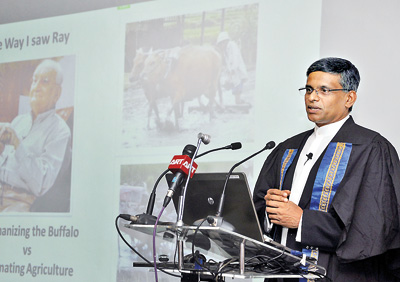Sunday Times 2
Innovating a nation
“We agreed that the ‘impossible’ might well become ‘possible’ on another occasion, at another time, when experience and technology developed further,” wrote the late Dr Ray Wijewardene in an essay on his friend Arthur C. Clarke in 2005. Ten years later and with both great men having passed on, how far has Sri Lanka come in conceiving the impossible as possible?

Keynote speaker Deepal Sooriyaarachchi
Innovation, a boundless pursuit of Ray Wijewardene’s life, was yet again the focus of the fifth Ray Wijewardene Memorial Lecture, held on November 30 by the Ray Wijewardene Charitable Trust and Institute of Engineers Sri Lanka. However, keynote speaker Deepal Sooriyaarachchi surpassed individual and company platforms of innovation to tackle the issue on a national level in his address, “Shall We Nationalise Innovation?”
Now a widely respected marketing and management consultant, author, trainer and speaker, Mr. Sooriyaarachchi recalled meeting Ray Wijewardene as a young marketer. “He once said to me, ‘Deepal, when I invented the two wheel tractor, somebody asked me if I had automated agriculture or mechanised the buffalo? I think I mechanised the buffalo.’ I was touched by the simplicity and humility of that statement,” said Mr. Sooriyaarachchi. “It was a life changing moment for me.”
In his lecture, Mr. Sooriyaarachchi highlighted five essential factors that made up the “Innovator’s DNA” – observing, questioning, experimenting, networking and associational thinking. “Innovation comes from asking the right questions and in order to do that you need to observe with a fresh mind,” said Mr. Sooriyaarachchi. He used the example of Velcro, which was invented in 1948 by Swiss engineer Georges de Mestral, to illustrate his point. Mestral first conceptualised Velcro when removing burdock burrs stuck to his trousers after returning from a hunting trip with his dog. “Thuththiri – how many of us have grown up with it? There is so much about it in our language and culture, we have observed it so much, so why weren’t we able to invent Velcro? It’s because we weren’t asking the right question,” said Mr. Sooriyaarachchi.
“Every year there are inventions submitted in competitions of improved versions of the rubber tapping knife. But we all know the problem is not with the knife, it’s with labour. No one likes waking so early in the morning and fighting leeches to tap rubber. The question we should be asking then is how do we solve the labour problem?”
Mr. Sooriyaarachchi also spoke about external influences that shape young innovators, drawing from studies conducted on contemporary icons like creator of Facebook, Mark Zuckerberg, which he then compared to the current generation of young Sri Lankans. A major issue identified was lack of exposure and support for innovative thinking in our education system. “Our education system needs to promote ‘thinking’ as a skill. In countries like Singapore the curriculum focuses on developing thinking skills,” said Mr. Sooriyaarachchi. “75 percent of A/Ls students in Sri Lanka don’t have access to science and mathematics labs, but these are essential subjects.”
“We also need to develop languages and humanities,” he added. Interdisciplinary education prompts associational thinking by allowing students to relate different concepts and fields, but “is completely lacking here, even at university level,” he said.
Communication was another area discussed and Mr. Sooriyaarachchi emphasised the role of teamwork in fostering innovation. “In Sri Lanka, team assignments are not between children but between parents and children.” Our students have little intrinsic motivation, he said, with parents often determining their careers and decisions for them. “I have been invited to speak at schools to motivate children to become prefects because their parents disliked it interfering with studies.”
Finally, Mr. Sooriyaarachchi impressed the need for financial investment and promotion of innovation by policy and media in order to make it a national phenomenon. Good infrastructure and collaboration between the government and innovative platforms might even help produce more efficient solutions to local problems like traffic congestion, he said.
Innovation also needs to be celebrated by the media in order to spur public discussion and interest. However, changing the mindset of a nation must always start with the individual and as long as the legacy of Ray Wijewardene remains to inspire more individuals to question what is impossible, an innovative Sri Lanka will always be a possibility.

